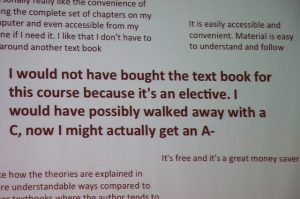2015 Open Textbook Summit attendance was higher than ever as the open textbook community grows and develops.

175 faculty, students, librarians, administrators, policy makers and authors, all advocates of open textbooks, gathered to present, listen, learn and collaborate at the 2015 Open Textbook Summit held May 28-29 at the SFU Harbour Centre.
Participants shared their interests and knowledge throughout two days and 32 presentations, all of which were given by people who are actively working on open textbooks. Considering that there were only 28 attendees at the first Open Textbook Summit in 2013, this tremendous growth in interest and involvement clearly indicates the strength and ability of the project to overcome barriers and make textbooks accessible to all. Today, students can access and use 90 open textbooks in subjects such as English, sociology, geology and psychology.
We spoke with Clint Lalonde, Senior Manager (Acting), Open Education BCcampus, and one of the presenters at the summit, about the increase in attendance at the 2015 OTS.
“This summit was an opportunity to bring everyone together around that commonality of open textbook and start to really develop a community. It’s become much more of a community development…a place where the open textbook community can connect with other people here in British Columbia. We’ve got more local participation from people in BC who are currently working on open textbook projects at institutions.
A lot of BCcampus funded projects were the basis of this year’s presentations. This was a great chance for people to see what has happened in the project over the last number of years, to see the scope of it. BC has one of the biggest open textbook projects in the world right now. It’s quite massive. There are a lot of people involved. Alberta has just announced they are in the midst of a project. This summit was a chance for people to come together and learn from each other. This is really what’s at the heart of the summit. Learn connect and collaborate.”
We also asked Mr. Lalonde about the value of open textbooks to students beyond the obvious cost savings. We asked if the open textbook project improves student outcomes.
“There is evidence that it’s improving outcomes,” Mr. Lalonde said. “Students have access to their resources on the first day. They’re ready to learn on the first day. Also costs being what they are, students are just not buying textbooks, and trying to get by in class without their resources. With a digital version of the textbook available immediately, the student is able to start the first class with resources in hand.”
He added, “There is also research evidence that students are doing better when their instructors tailor the resources to the fit the needs of the students. The faculty that are actually teaching the courses are developing the textbooks, so what comes out is a much stronger textbook that meets the specific needs of the course.”
What do you think the future holds for the Open Textbook projects?
“People are beginning to understand there is another way we can do things in higher Ed. We can actually have some control and empowerment over the way that we do things. After this summit, more people are going to go back to their institutions with even more interest and with more support and championing for open textbooks within their institutions. A project like Open Textbook really turns the entire model of text book production and procurement right on its head.”
Steven Earle PhD, faculty member at Thompson Rivers University – Open Learning, and a research associate at VIU, spoke at the OTS 2015 about the creation of a Physical Geology open text through the Earth Science Articulation Committee. We asked him about his overall impression of the summit.
“I attended the Open Textbook Summit because I knew that other authors would be there and hoped that I would be able to learn from their experiences. I was not disappointed! Most of the sessions that I attended were given by other authors, and I had numerous conversations with other authors. All had a wealth of ideas about how to get the most out of the openness of open texts: how to get students engaged with the content, how to make content accessible to everyone, ways to get other faculty involved and how to encourage them to use open texts. It was also great to hear the student perspective on why and how they like to use open texts. It is clear that the Open Textbook project is progressing well, and it’s exciting to be a part of this innovative and important effort to make quality textbooks available to everyone.”
Notable Quotes
“This summit was a chance for people to come together and learn from each other. This is really what’s at the heart of the summit. Learn connect and collaborate.” Clint Lalonde, Senior Manager (Acting), Open Education BCcampus
“It is clear that the Open Textbook project is progressing well, and it’s exciting to be a part of this innovative and important effort to make quality textbooks available to everyone.” Steven Earle PhD, PGeo, Vancouver Island University
